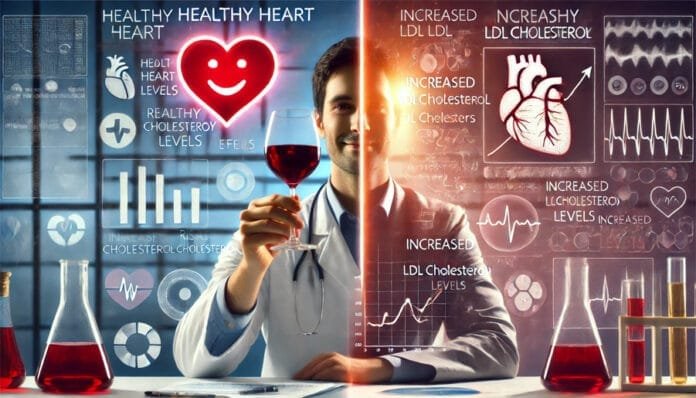A groundbreaking study published in the Journal of the American Medical Association (JAMA) has sparked debate in the medical community. Conducted by researchers from the Institute of Science of Tokyo and Harvard Medical School, the study examined 3.2 lakh health checkups of 57,700 individuals in Japan between October 2012 and October 2022. The results suggest that quitting alcohol may increase LDL (bad cholesterol) levels, while those who continued drinking regularly had relatively stable LDL levels.
However, these findings have raised significant skepticism among health experts, who have questioned the study’s methodology and interpretations. As medical professionals stress caution, the larger discussion about alcohol’s impact on health has come under renewed scrutiny.
Key Findings of the Study
According to the research conducted in Japan:
- Individuals who quit alcohol had higher LDL (bad cholesterol) levels compared to those who continued drinking.
- HDL (good cholesterol) levels were found to be lower in those who quit drinking, suggesting a potential decline in cardiovascular protection.
- Interestingly, a slight improvement in cholesterol levels was observed in individuals who started drinking after previously abstaining.
- The study recommends regular cholesterol monitoring for individuals undergoing changes in their alcohol consumption patterns.
Despite these findings, many experts have raised concerns regarding the study’s validity, emphasizing the need for more comprehensive, controlled research before drawing firm conclusions.
Health Experts Question the Research Methodology
Leading medical professionals and addiction specialists have expressed skepticism about the study’s approach and findings. Stephen Bright, an addiction expert at Edith Cowan University, Australia, pointed out key issues:
- Selection Bias: The study compares former drinkers with moderate drinkers, which may lead to misleading conclusions. Many individuals who quit drinking might have been heavy drinkers before, leading to naturally higher baseline LDL levels.
- Lack of Controlled Variables: Other lifestyle factors, such as diet, exercise, and genetics, were not adequately accounted for, which could heavily influence cholesterol changes.
- Contradiction to Existing Research: Earlier studies, including the 2024 study by Tim Stockwell from the University of Victoria, Canada, analyzed 107 research papers and debunked the supposed cardiovascular benefits of moderate alcohol consumption.
The Myth of Alcohol’s Heart Benefits Debunked
For years, there has been a widespread belief that moderate alcohol consumption, particularly red wine, may promote heart health. However, modern research has challenged and disproven this notion:
- A 2024 analysis of 107 studies found that many reports suggesting heart benefits incorrectly compared moderate drinkers to non-drinkers, failing to differentiate between lifelong abstainers and former heavy drinkers.
- The World Health Organization (WHO) firmly stated in The Lancet Public Health Journal (January 2023) that no amount of alcohol consumption is safe.
- WHO research confirmed that alcohol contributes to over 200 diseases, including cardiovascular diseases, liver disorders, and various cancers.
Understanding Cholesterol and Its Impact on Health
To fully comprehend the implications of this study, it is crucial to understand the role of LDL (bad cholesterol) and HDL (good cholesterol) in cardiovascular health.
- LDL (Low-Density Lipoprotein): High levels of LDL cholesterol lead to plaque buildup in arteries, increasing the risk of heart attacks and strokes.
- HDL (High-Density Lipoprotein): This form of cholesterol helps remove LDL from the bloodstream, offering protective benefits against heart disease.
- Triglycerides: Elevated triglyceride levels are often linked to excessive alcohol consumption, which may increase the risk of metabolic disorders.
While the Japanese study suggests that quitting alcohol could raise LDL, it fails to account for other contributing factors, making it imperative to interpret the findings with caution.
The Safer Approach: A Balanced Lifestyle Over Alcohol Consumption
Leading health organizations emphasize that cholesterol management should be approached holistically, focusing on:
1. Diet and Nutrition
- Increase fiber intake: Whole grains, fruits, and vegetables help lower LDL cholesterol.
- Reduce saturated and trans fats: Found in fried foods, processed snacks, and fatty meats, these elevate LDL levels.
- Consume heart-healthy fats: Avocados, nuts, and olive oil boost HDL while lowering LDL.
2. Regular Physical Activity
- Engaging in at least 150 minutes of moderate exercise per week improves cholesterol profiles.
- Aerobic exercises such as brisk walking, cycling, and swimming increase HDL while reducing LDL and triglycerides.
3. Stress Management and Sleep
- Chronic stress can elevate LDL levels while reducing HDL.
- Quality sleep of 7-9 hours per night is crucial for metabolic balance and heart health.
4. Avoiding Harmful Substances
- Smoking cessation significantly improves cholesterol levels.
- Reducing processed sugar intake prevents metabolic disturbances that lead to cholesterol imbalances.
Conclusion: Should You Worry About Cholesterol When Quitting Alcohol?
While the recent Japanese study raises interesting questions, the medical consensus remains firm: alcohol consumption poses more harm than benefits. The study’s findings should not be interpreted as encouragement to drink, but rather as a call for regular cholesterol monitoring and a healthier lifestyle.
Experts emphasize that a well-balanced diet, regular exercise, and overall healthy living are the most effective ways to maintain optimal cholesterol levels. Given the well-documented risks associated with alcohol—including liver disease, cancer, and addiction—there is no justifiable reason to drink for the sake of cholesterol management.
Ultimately, the best approach is to prioritize heart-healthy habits and seek medical guidance when making significant lifestyle changes.
















